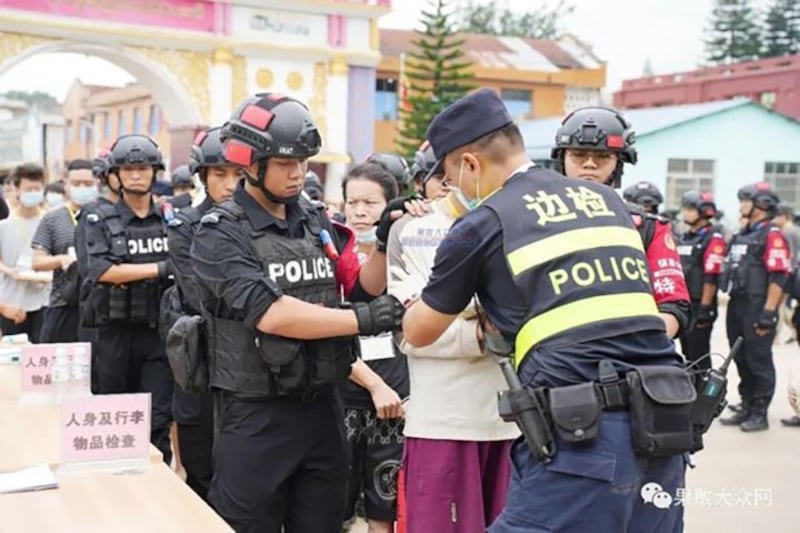China’s Ministry of Public Security has issued arrest warrants for 10 people alleged to have been involved in online scamming businesses in Myanmar’s Kokang Self-Administered Zone in northern Shan state.
Among the 10 was Bai Suocheng, the region’s former leader and a former member of parliament from the pro-military Union Solidarity and Development Party, or USDP. His son, Bai Yingcang, the 31-year-old commander of the Kokang militia, was also named, according to junta-controlled media.
Scamming gangs have proliferated in Shan state, along eastern Myanmar’s borders with China and Thailand, amid the political chaos in the wake of the Feb. 1, 2021, coup d’etat.
The gangs have benefitted from widespread unemployment and poor oversight. They’re known to brutally punish trafficking victims who refuse to work for them or fail to meet earning quotas, sometimes with deadly consequences.
Chinese Minister of Public Security Wang Xiaohong and junta chief Senior Gen. Min Aung Hlaing met in Naypyidaw on Oct. 31 and agreed to form a joint task force to eradicate online scam rings in Laukkaing, Kokang’s principal township.

Weeks later, the Chinese government issued a set of warrants for four family members accused of orchestrating telecom scam rings in Myanmar staffed by human trafficking victims.
One of the four was Ming Xuechang, a former member of parliament for the USDP who fatally shot himself after police in Kokang took him into custody. The other three were immediately handed over to Chinese authorities at the border, according to junta-aligned media outlets.
Beijing’s initiative
Earlier in October, authorities in China arrested 11 businesspeople at a trade fair in Yunnan province’s Lincang township, according to Chinese state media.
Among them was Liu Zhangqi – a hotelier and former USDP lawmaker who is one of Ming Xuechang’s grandsons.
The new warrants indicate that Beijing remains unhappy with the junta’s lack of decisive action against online fraud operations in Kokang, political commentator Than Soe Naing told Radio Free Asia.
“It is difficult to go in and arrest those who are involved in the online fraud because they were parliamentary members of the Union Solidarity and Development Party, which is a political party backed and recognized by the junta,” he said. “That’s why China had to issue the arrest warrants.”
RFA’s calls to junta spokesman Major Gen. Zaw Min Tun regarding the warrants went unanswered on Sunday.
But on Dec. 5, he said through the junta-controlled media that Myanmar won’t allow activities that harm the interests of neighboring countries. He added that Myanmar is actively participating in the crackdown on online fraud businesses.
Translated by Htin Aung Kyaw. Edited by Matt Reed and Malcolm Foster.
